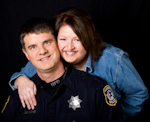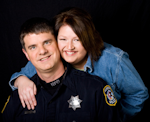Vicarious Trauma: Screening Police Officers for Risk
After researching vicarious trauma, it would be easy to be more confused than ever as to how this concept applies to law enforcement culture because many of the common “signs and indicators” tend to be accepted parts of the police culture and personality. For instance:
· having difficulty talking about their feelings;
· free floating anger and/or irritation;
· startle effect/being jumpy or hypervigilance;
· over-eating or under-eating;
· difficulty falling asleep and/or staying asleep;
· losing sleep due to worry about their job;
· worried that they are not doing enough;
· dreaming about traumatic experiences;
· diminished joy toward things they once enjoyed;
· feeling trapped by their work or the job;
· diminished feelings of satisfaction and personal accomplishment;
· dealing with intrusive thoughts about civilians with especially severe trauma histories;
· feelings of hopelessness associated with the job;
· blaming others.
For many or most officers a lot of these are just typical behaviors grumbled about before a roll call or while going car-to-car to catch up on what is going on in, at a union meeting, or end-of-shift gathering at Hooter’s or another wing joint of choice. Others remain unspoken, popping up as uninvited thoughts only to be shoved back down and shielded from public view. They show up on and off the job and become part and parcel of a police career.
Vicarious trauma, as described by The American Counseling Association, is a state of tension and preoccupation of the stories/trauma experiences described by others. This tension and preoccupation might be experienced by police officers in several ways, and most might avoid talking or thinking about how auditory or visually witnessing a traumatic event effects them to a point of losing empathy or becoming numb to trauma. Instead traumatic events become almost expected and simply brushed off. When officers are studied it has been noted in several papers that officers who investigate sexual crimes, especially those working with child pornography, are the most susceptible to vicarious trauma.
As two practicing clinical social workers in private practice with experience working with and treating cops, as well as one of us being a full-time patrol officer, the question of “How do we tell the difference between the usual and customarily expected cop behaviors and survival skills that help with healthy detachment from the job on one hand, and when they become symptoms of vicarious trauma on the other?”
The steps and techniques we will take to discern the two are good for officers to know, and may serve as a helpful “self-exam” to understand if feelings of depression or anxiety that may be considered at face value and as having no underlying occupational trigger, or accepted as simply burnout or cynicism and thought of as a normal part of the law enforcement experience, might instead be tied to vicarious trauma. They are, as follows:
· Ask the right open-ended questions and get to know the person in their experience without judgement or bias. This is one of the most sacred tenets of assessment for all licensed social workers. Getting to know who someone is within the context of their family history (both present and family of origin), culture and traditions, values, and beliefs is an opening to assess their level of resilience. We examine whether the above behaviors are part of their coping skills that keep them emotionally healthy, or if behaviors have morphed into a destructive pattern or source of pain;
· We are open to the possibility of “what lies beneath.” When a police officer is in our office, regardless of the stated reason they’ve sought therapy we are vigilant to the possibility of work-related vicarious trauma as a primary cause of the presenting problem, or as a trigger for older, underlying genetic or environmental issues;
· We look for indicators of a marked impairment in functioning overall, of course, but also whether it is “occupationally centered.” While it’s true that burnout and job stress can and will bleed into off-duty life, it is fairly easy to pinpoint if the off-duty effects originated or were triggered in the on-duty world, and why. If the source is vicarious trauma, the effects on and off the job will likely be dramatic and the professional-to-personal bleed over significant;
· We consider if there is an inability to “bounce back” from low moods and decreased or impaired functioning. Occupational burnout is common and expected, and low moods normal, but we can typically bounce back from each in fairly short order. When something is pinning mood to the floor, or what started out feeling like burnout just can’t be shaken or corrected and is only getting worse, something else is going on;
· Many of the signs and indicators of vicarious trauma listed at the start of this article are symptomatic of post-traumatic stress disorder, so screening for PTSD is often indicated. What is important to remember is that police officers are susceptible to PTSD even if the triggers have happened to someone else. The traumas are usually cumulative and offer absolutely no immediate physical threat to the investigating officer(s) at all, and yet cause significant brain injury to cops who merely immerse themselves in the pain and trauma of others.
Vicarious trauma is a real problem in law enforcement. Cynicism is usually thought of in terms of “seeing people at their worst” but sometimes it is more about “seeing and taking care of people who have experienced the worst” – and then experiencing it yourself. The cynicism is an ego defense because empathy is too psychologically dangerous.
The good news is that vicarious trauma is highly treatable, and treatment begins with awareness.

Michael Wasilewski
Althea Olson, LCSW and Mike Wasilewski, MSW have been married since 1994. Mike works full-time as a police officer for a large suburban Chicago agency while Althea is a social worker in private practice in Joliet & Naperville, IL. They have been popular contributors of Officer.com since 2007 writing on a wide range of topics to include officer wellness, relationships, mental health, morale, and ethics. Their writing led to them developing More Than A Cop, and traveling the country as trainers teaching “survival skills off the street.” They can be contacted at [email protected] and can be followed on Facebook or Twitter at More Than A Cop, or check out their website www.MoreThanACop.com.

Althea Olson
Althea Olson, LCSW and Mike Wasilewski, MSW have been married since 1994. Mike works full-time as a police officer for a large suburban Chicago agency while Althea is a social worker in private practice in Joliet & Naperville, IL. They have been popular contributors of Officer.com since 2007 writing on a wide range of topics to include officer wellness, relationships, mental health, morale, and ethics. Their writing led to them developing More Than A Cop, and traveling the country as trainers teaching “survival skills off the street.” They can be contacted at [email protected] and can be followed on Facebook or Twitter at More Than A Cop, or check out their website www.MoreThanACop.com.


